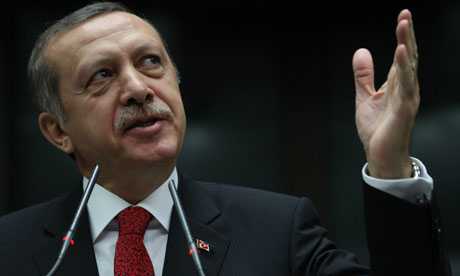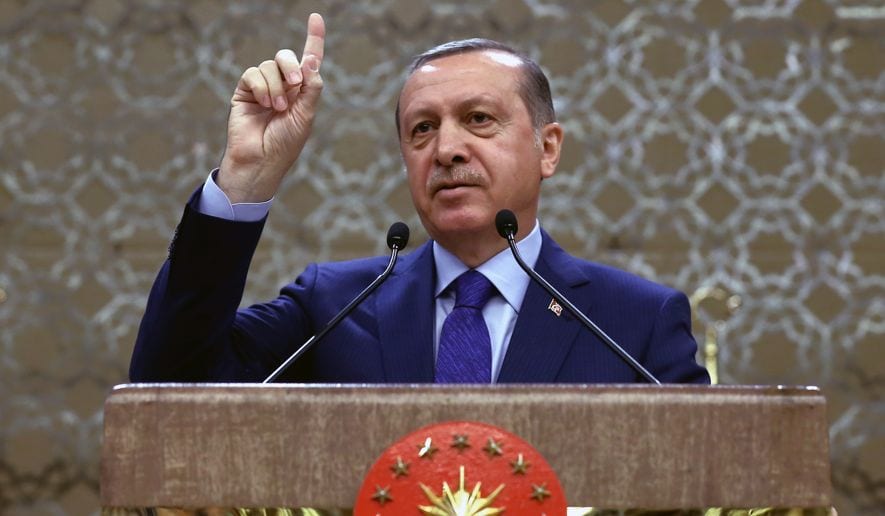Yet Another Crisis in Turkey-Israel Relations
Emrullah Uslu
In an earlier EDM analysis it was observed that since Israel’s Gaza offensive began, Turkish Prime Minister Recep Tayyip Erdogan’s harsh criticism of the operation has made him the champion of the man in the street in the Muslim world (see, EDM, January 7, 15). Despite the fact that Turkish diplomats and ministers have tried in the last three days to repair the “Gaza damage” (see, EDM, January 27), Erdogan condemned Israeli policies in Gaza in the presence of Israeli President Shimon Peres in a panel discussion at the World Economic Forum in Davos on January 29. In response, Peres raised his voice, pointed his finger at Erdogan, and fiercely defended his country’s incursion into Gaza:
What would you do if rockets were fired at Istanbul every night? …Do you understand the meaning of a situation where hundreds of rockets are falling a day on women and children who cannot sleep quietly, who need to sleep in shelters? What is the matter with you? You don’t understand, and I am not prepared for lies (Jerusalem Post, January 30).
Erdogan wanted to respond to Peres but the moderator unsuccessfully tried to end the panel. Erdogan, however, had a minute of response in which he slammed Peres back by saying:
You are raising your voice, because I know it is a sign of expressing a guilty feeling. When it comes to killing, you know very well how to kill. I know very well how you killed children on the beaches. Two of Israel’s Prime Ministers personally told me—if asked I could reveal their names—that they feel happy when they enter into Gaza… (“The Great Game Revisited,” , January 29).
After he left the panel Erdogan said that his anger was toward the moderator but he did not step back from his remarks on Israeli policies on Gaza. Later it was reported that Peres phoned Erdogan and apologized about raising his voice and explained that “I raised my voice because I am told that it was difficult to hear if you do not speak loudly” (Yeni Safak, January 30).
The heated debate in Davos immediately resonated in Turkey. The people of Turkey, who had already demonstrated their anger toward Israel over the Gaza crisis (see EDM, January 7), showed their support for their prime minister. Within a few hours, 97.5 percent of the respondents (36344 votes) to an opinion poll in the Internet said they supported Erdogan, while only 1.7 percent (620 votes) said that Erdogan’s response was not right (www.haber7.com, January 29). Thousands of people went to the airport to welcome Erdogan when he arrived in Istanbul at 2:20 AM in the morning. TV channels began live broadcasting upon his arrival. Erdogan said at a press conference that:
I do not want to be a leader who made his decision on Turkish-Israeli relations at a time of anger. We should know that Turkey should not determine its policies with the attitude of who says what. The other side should think “what happens if we lose Turkey?” Turkey is a big country and should act with this perspective (NTV, January 30).
After his press conference Erdogan delivered a speech to thousands of joyful people carrying signs saying “welcome conqueror of Davos” and “a new World leader.” Erdogan told them that “I understand the feelings of you who came here in the middle of the night. Turkey should not make its decisions on the basis of who says what if Turkey takes this step or that step. The other sides should think about what happens if they lose Turkey” (NTV, January 30). While Erdogan was outlining Turkish-Israeli relations on the basis of the idea that “the other side [Israel] should think what happens if it loses Turkey,” an Israeli official outlined Israel’s position: “Erdogan’s actions in Davos show that he doesn’t want to miss an opportunity to further harm Turkish-Israeli relations. …Israel’s strategic relationship with Turkey is important to us, but it is no less important to Turkey.” The official warned that Israel was growing increasingly tired of Erdogan’s tirades, and was unlikely to make any more efforts to “chase after the Turks” (Jerusalem Post, January 30).
Political observers in Turkey and around the world wonder why Erdogan stormed off the stage. The first reason may be found in his psychological makeup. Even he himself admits that he is not one to use diplomatic language. When he feels he is being attacked, he responds fiercely. Second, and more important, if Erdogan had not responded to Peres’s “loud and finger-pointing response,” it could have meant his political demise in Turkey. Not only would the opposition parties use Peres’s angry response against him but majority of his admirers, who see him as a straight- talking, fearless leader, would abandon him permanently. Erdogan’s strident criticism of Israel may have put him in a situation from which he cannot step back. An opinion poll by the Genar poling company from January 9 to 19 showed that 71.9 percent of the respondents approved of Erdogan’s stance toward Israel; 59 percent supported the idea of sending Turkish troops to Gaza for a peace-keeping mission; 59.4 percent felt that volunteers should be allowed to go to Gaza; and 63.2 percent of those who approved of the volunteers wanted to go Gaza themselves (www.haber7.com, January 30).
It will be interesting to see how Turkish and Israeli diplomats will manage to normalize relations again, but on the domestic level, Erdogan has become a hero of the masses. With this popularity one can assume that Erdogan is already assured of victory in the municipal elections in March.
On the international level, Erdogan’s condemnation of Israel may harm Turkish foreign policy positions, but in the streets of the Arab world Erdogan is becoming a “new Nasser.” A Turkish TV channel reported that Palestinians would organize rallies after Friday prayers to show their appreciation for what Erdogan said (Ulke TV, January 30).
Source: Eurasia Daily Monitor, The Jamestown Foundation – January 30, 2009 — Volume 6, Issue 20




